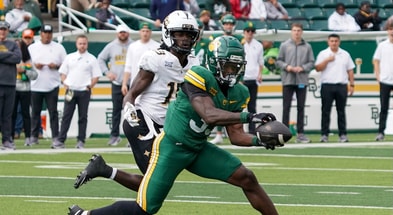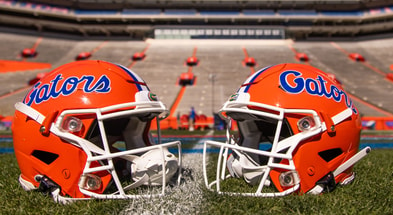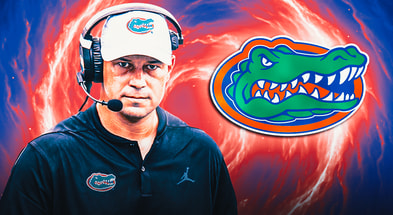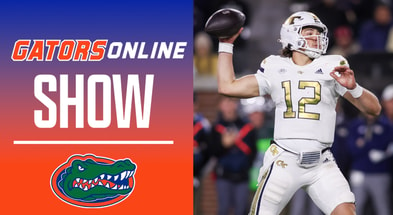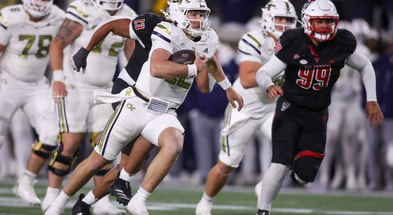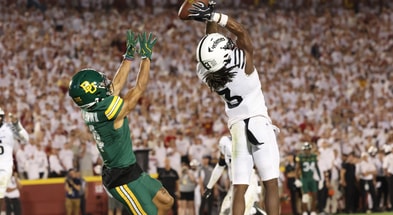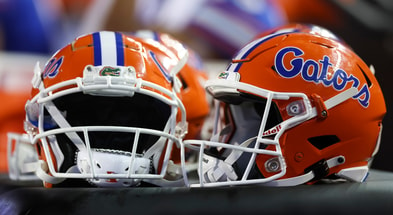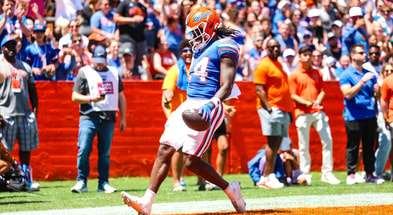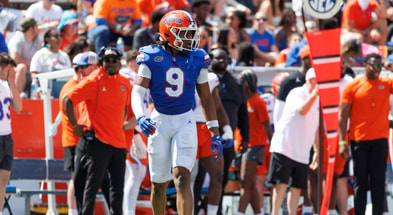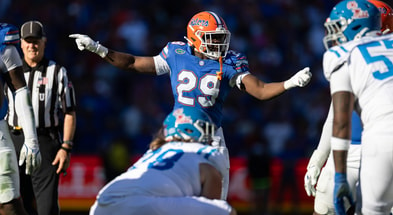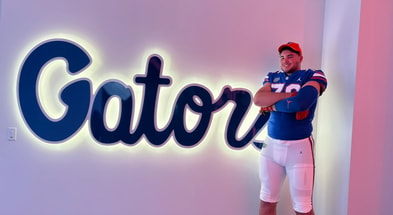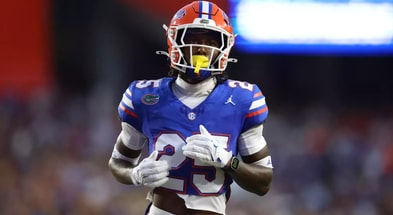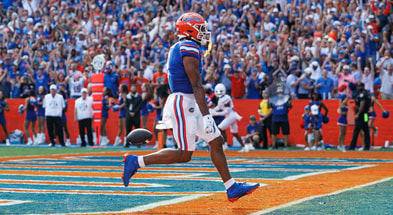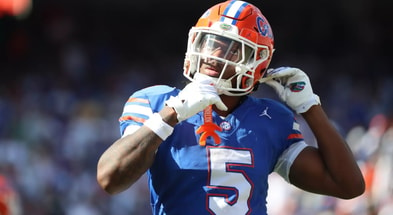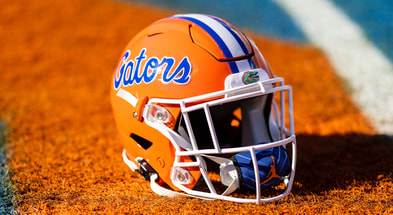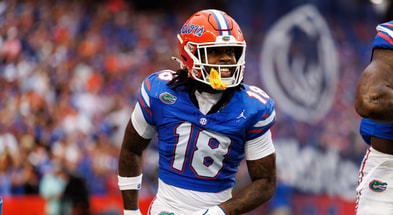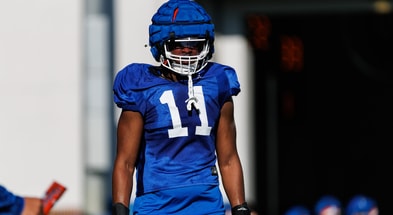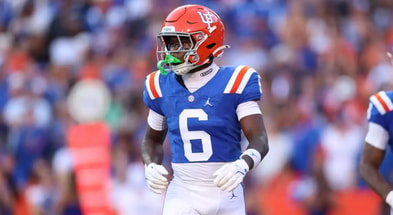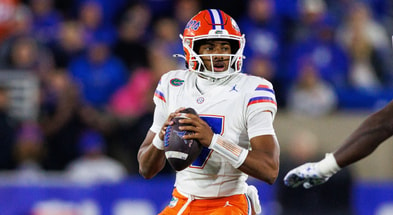WATCH: New DC Austin Armstrong talks Billy Napier reunion, replacing Patrick Toney
GAINESVILLE, Fla. — Gators defensive coordinator Austin Armstrong met with the media for the first time on Saturday since being hired ahead of spring camp.
The 29-year-old Armstrong replaces former Florida DC Patrick Toney, who left the program on Feb. 22 to become the defensive backs coach for the Arizona Cardinals.
Armstrong, who comes over from Alabama after spending two seasons as the DC at Southern Miss, coached alongside and under Toney when was in the same role at Louisiana in 2020.
Toney coordinated the defense and worked with the outside linebackers, while Armstrong coached inside linebackers. Armstrong also served as a grad assistant with Billy Napier and Toney in 2018.
In the video below, Armstrong discusses his reunion with Napier, his relationship with Toney, leaving Alabama for Florida, spring install, what the staple of his defense will be and more.
Austin Armstrong quotes
On what Napier has meant to his coaching career:
Armstrong: “A lot. One, he’s a great person. That really matters to me. The opportunity to come here, go to a place you can play complementary football and be successful defensively really means a lot. But as a person, I wouldn’t be standing here today without kind of standing on the shoulders of giants, per se, like my family, other people I worked with. But Coach Napier’s been a big part of that. I was at Louisiana, probably wouldn’t have got a job at Georgia without him, truth be known, right? We got a job there. Probably wouldn’t have got the opportunity to come back and be the linebackers coach. If I was not at Georgia and working at Louisiana, Will Hall probably couldn’t have hired a 27-year-old unexperienced defensive coordinator, right? A lot of it kind of trails back to him.”
On working with Toney and how he impacted him:
Armstrong: “Unbelievable, you know what I mean? We talk daily. Probably wouldn’t have taken the job here without his blessing of knowing what the situation was. I left comfort. I was at a comfortable place, and he is a dear friend. He’s a better person than football coach. I think he’s one of the better football coaches I’ve ever seen. He got this thing – along with the staff – going in the right direction. He’s somebody that we see football similar, but we see it different, right? We’re able to have educated conversations and work through issues together. But he’s probably not going to get enough credit for the job he did here getting this thing going the right direction.”
Top 10
- 1New
Brendan Sorsby
Latest intel on transfer QB
- 2Trending
Raleek Brown
Coveted transfer sets SEC visit
- 3
Josh Hoover
QB transfers to Big Ten
- 4Hot
Ty Simpson
Evaluating future plans
- 5
Transfer Targets
Big visits on deck
Get the Daily On3 Newsletter in your inbox every morning
By clicking "Subscribe to Newsletter", I agree to On3's Privacy Notice, Terms, and use of my personal information described therein.
On what Toney said to make him comfortable about leaving Alabama:
Armstrong: “It was easy but tough. I don’t know if that makes any sense to anybody. Nick Saban was my hero, and the opportunity to be there and work for him and being at home. We lost my mother in September, and it was really, really hard. And the good Lord puts you at Alabama of all places, you know? Leaving Southern Miss was hard, too. We had that thing going in the right direction. Hattiesburg’s unbelievable. Southern Miss is an unbelievable place. Even to go to Alabama, it was a no-brainer, but it was still something to think about, because the people make the place. Then it was like, man, this lands on your table. What do you do? Just had prayer and asked a lot of people I really care about what I should do, and the opportunity to come to the University of Florida, like what are you talking about?”
On what the staple of an Austin Armstrong defense will be:
Armstrong: “The thing that we’ve got to get going here…to answer your question, we talk about Florida DNA. We talk about the Gator DNA. We want to be tough. That tough isn’t acting a fool. It’s striking blockers, being mentally tough to handle situational football. We want physicality. When that ball is in the 53 1/3, we’re gonna hunt the ball, and we’re gonna punish the ball carrier. Our objective every week is to change the way the opponent thinks. When that ball is in my hand, I’ve got to really consider people with orange helmets are coming. And then love. We want to play for each other. We want to love each other and love this game and love this institution. We want to love ourselves, right? We want to be in a situation, and we want to play with enthusiasm. That’s something that I’ve really challenged everybody here. guys, football’s fun. We’re at the University of Florida. Are you serious? All these kids now, like, they have a lot of anxiety because they’re highly touted and stuff like that. My thing is like, quit playing the game with a burden and play it like it’s a blessing. You’re gonna make mistakes. Ain’t no scoreboard out there right now. Go play. Go enjoy it. That’s where we’re trying to push the energy and the tempo and we’re definitely not going to be a defense that sits around with our hands in our pockets.”
On the learning curve with a new situation:
Armstrong: “Everybody here you got a blank slate. Every player every coach. Now certainly you have to gather information, you know from people here in personnel, Coach Napier, getting feedback from the coaches. But what I did is when I got here that first week, I met with every defensive player. Then I met with every defensive coach, and that’s kind of wanting to hear their perspective on stuff and I was quiet, I listened. And you know, each day each player’s building their resume with me. You know, we have film. We, film everything, and I tell them, ‘Don’t tell me, show me.’ And each day, you know, certainly certain players here you have a lot of respect for that have proven to play a lot of snaps and be productive, right? And you got to give those guys a little bit of benefit of the doubt. Everybody else may have an opportunity to prove themselves and I’ve been placed before.”
On the benefit of a roster flip with new players:
Armstrong: “You know, first of all, I can’t commend the staff and know the job they’ve done. I mean culture, players, all those things like that, you know. At the end of the day, you obviously want to inherit a situation where everybody’s played and stuff like that, but I don’t how much that matters anymore, you know what I mean? We have a lot of kids right now that are doing everything that we asked him to do to be really good players. And we have a lot of young good players and they fit our values and principles, and they’ve been a lot of fun to coach.”
On knowing he’s ready for this job at an early stage in his career:
Armstrong: “I don’t think you ever know you’re ready for anything. You know what I’m saying? Like when I got married, I thought I was ready to get married and I wasn’t ready to get married, you know what I mean? Everybody says that has kids you’re not ready to do that, right, but the thing that was awesome for me is I was in a leadership role for a period of time, so coming in and doing the install, making the walkthrough plans you know, because what we do is a little different now. Like are learning, you know. How we teach is different, you know, for example, like our players don’t sit in a meeting more than like 18 minutes. We’re constantly engaged. For example, like today we met for 18 minutes as a unit, and we went to the indoor and walked through for 18 minutes and went back and met for 20 minutes. And then we had a pre-practice walkthrough for 15, right. So, what we do is different, right? I’ve been doing that and making choices and decisions relative to a leadership role being a coordinator. That’s easy. You’ve been doing it. You know, I know it may not make a lot of sense, but it is, right? Because you’ve been doing it so you’re really comfortable in it. You know, that’s why I’ve been fortunate. I’ve been in a leadership role and making those decisions at Southern Mississippi. It was actually harder for me going to Alabama in a short period of time and shutting up, you know, and learning. Because you go from working for an offensive head coach like we do here and making all the defensive decisions outside of the final decision in which the head coach makes to not, to back in it. That was kind of, you’re naturally comfortable doing that, you know what I mean? So probably not as much. The easiest part for us right now probably is calling the game and being the coordinator. That’s the easiest part going to this level. Now, it’s the other things that come with it. Managing people, managing your roster and recruiting.”
